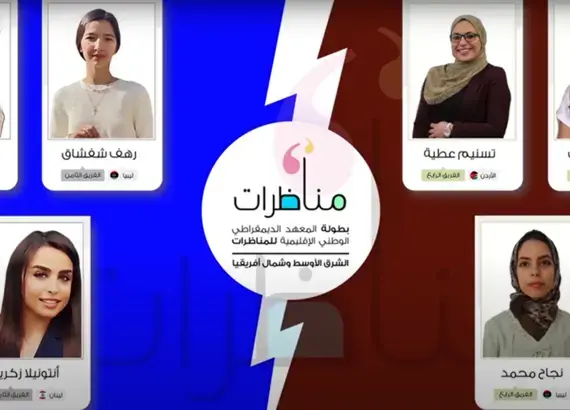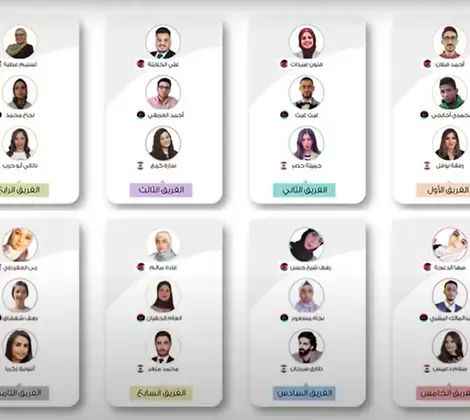
Success Story
Youth from Jordan, Lebanon, and Libya Tackle Cross-Regional Issues in Virtual Debates
Young people in countries throughout the Middle East and North Africa (MENA) find themselves grappling with similar challenges as they push their governments to be more responsive to the needs of citizens. While the COVID-19 pandemic prevents travel across the MENA region, the National Democratic Institute (NDI or the Institute) hosted and broadcasted a virtual tournament in August 2021 that brought together youth from different countries to debate data-driven solutions to transnational public policy problems.
For the tournament, conducted on Zoom, a total of 24 young people—eight each from Jordan, Lebanon, and Libya—were randomly assigned to eight teams of three, with one participant from each country on each team to cultivate cross-regional collaboration. The debaters had varying degrees of experience, and NDI helped them prepare for the tournament with introductory sessions on the debate style, as well as conversations with issue experts, who presented on the debate topics such as climate change, the regulation of information spaces, and women and youth representation in government. Coaches from various NDI country offices helped teams use the information from experts to develop arguments for positive and negative positions in response to the debate questions. At the end of the tournament, a debater from Libya remarked: “We'll see the fruit of these trainings throughout our lifetimes. I learned a lot about Lebanon and Jordan, and the weaknesses and strengths of all of us, including myself. We discovered a team spirit, and we cannot succeed without a team spirit based on synergy, harmony, and solidarity.”

The teams advanced through single-elimination quarter-finals and semi-finals in order to qualify for the finale. Experienced debate coaches from each of the three countries served as judges and awarded points based on the quality of participants’ arguments and counterarguments. One of the judges, who is a producer for a political talk show in Lebanon called Sar El Wa2et—which also features young people debating through a program with NDI—praised the participants for working together to overcome regional differences in pursuit of addressing common concerns. She said her experience on the judging panel was “enriching” and that she would use it “to launch a new phase of the Debate Academy” for her show in Lebanon.
Although most of the randomly-assigned teams were roughly balanced with women and men, the two teams in the championship debate were coincidentally the only two teams composed entirely of women. The motion debated during the finale was whether or not governments should incorporate a youth quota in parliaments. One of the members of the winning team reflected on her experience: “We made new friends and learned about new cultures and different habits shared by Arab people. We overcame language barriers, earned self-confidence, and became familiar with a new system of debate. We learned that Arab youth are full of strong will to work side by side as brothers and sisters to improve reality.”
Despite challenges along the way—including language barriers caused by distinct regional dialects of Arabic, as well as electricity and internet outages caused by an ongoing economic crisis in Lebanon—the debaters remained motivated to cooperate toward common goals. One participant from Lebanon said that he “learned the power of perseverance” and “personally benefited from a clearer understanding of the geopolitics of the region.”
Some of the debaters committed to continuing work on issues brought to their attention by the tournament. A participant from Jordan said it was the first time she “heard about decarbonization and its impact on climate. Now I'll do my best to deal with this and sensitize people to it.” Other debaters found such value in the cross-regional cooperation and the friendships they made along the way, they discussed organizing “a network to continue debates that include young people and disseminate a clear understanding of what’s going on in the world.” Some participants from Libya wanted to “set up a federation of youth to study and prepare a regional plan that will aim to upgrade the living conditions of youth in the region,” and “to consecrate the values of democracy and tolerance by organizing debates with different aims.”
Video Recap of NDI’s MENA Regional Debate Tournament
NDI’s MENA Regional Debates programming was funded with support from the National Endowment for Democracy (NED), USAID, and the Consortium for Elections and Political Process Strengthening (CEPPS).
NDI is a non-profit, non-partisan, non-governmental organization that works in partnership around the world to strengthen and safeguard democratic institutions, processes, norms and values to secure a better quality of life for all. NDI envisions a world where democracy and freedom prevail, with dignity for all.



